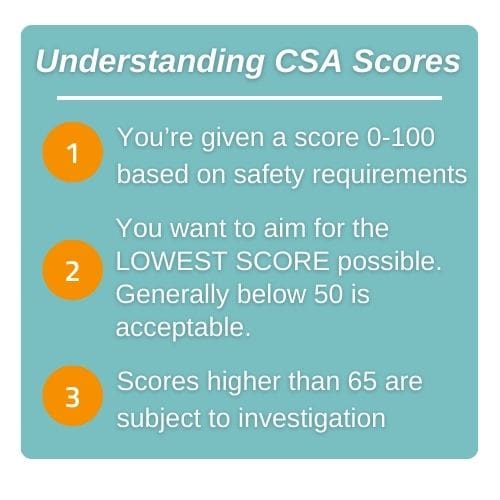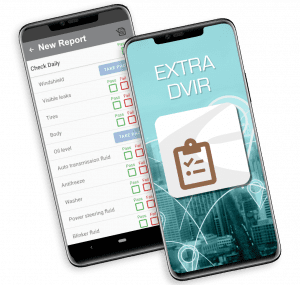
Whether a business is transporting its goods locally or across state lines, those products should be in good hands. Delivery trucks weigh thousands of pounds even without any extra cargo, so a good deal of training is needed to operate them. Additionally, some companies may only want to work with trucking companies that maintain above-average CSA scores.
The CSA is a safety and compliance program that is regulated by the Federal Motor Carrier Safety Administration (FMCSA). This organization carefully documents the performance of your drivers and the condition of your trucks to determine your company’s safety rating. Here’s everything you should know about how CSA scores work, and how you can improve yours if necessary.
The Basics of CSA Scores
The CSA (Compliance, Safety, and Accountability) program was created in 2010 to help mitigate the high volume of road accidents. Around that time, the NHTSA was reporting an average of 80,000 injuries per year due to large truck accidents. The CSA program is structured to detect both present and potential safety problems, which in turn can prevent collisions and promote accountability amongst all commercial vehicle operators.
A CSA score is determined by how well a carrier performs in each of the Behavior Analysis and Safety Improvement Categories (BASICs). Factors that will impact your score include:

- Unsafe Driving: This category covers inattentiveness, failure to wear seatbelts, incorrect lane changes or turns, reckless/aggressive driving, and lack of regard for speed limits. The FMCSA lists moving violations as the most common offenses committed by commercial vehicle drivers.
- Crash Indicator: This logs the history of collisions associated with your carrier.
- Hours-of-Service Compliance: Carriers must abide by HOS regulations to maintain a good CSA score.
- Vehicle Maintenance: This ranks a carrier’s ability to keep its trucks in proper working condition. In particular, the FMCSA pays close attention to the lights and brakes. However, any kind of defect or missed maintenance can impact your CSA ranking.
- Controlled Substances/Alcohol: This covers both use and possession, as these substances can impair a driver’s judgment.
- Hazardous Materials Compliance: This regulates the packaging and condition of any hazardous materials transported by the carrier.
- Driver Fitness: Drivers are expected to be in good physical condition to operate carrier vehicles, plus maintain a valid driver’s and CDL license.
All of that data is collected and stored in the FMCSA’s Safety Management System (SMS), which will provide you with an updated score once a month. To determine a ranking in each category, the FMCSA reviews the quantity and severity of all reported safety violations. Recent incidents will have a greater impact on your CSA score compared to older ones.
Reported crashes as old as two years can influence a CSA ranking. Compliance ratings are also impacted by the amount of inspections that have been ordered for the carrier. Acute and critical violations found during those assessments result in a higher accumulation of points.
How to Check CSA Scores
Carriers can review most of their BASIC scores in the SMS database at any time through FMCSA’s official website. Input the carrier name, MC number, or U.S. Dot Number in the box provided under the Check Motor Carrier Safety and Performance Data section. Final CSA scores are private, so you’ll have to request a PIN number from the FMCSA to gain access to yours. The PIN number will be sent by mail and you should receive a letter within 7-10 business days.
Even an examination of public BASIC scores can help you identify key trends and metrics that could be improved. You’ll be able to see patterns of speeding, weight violations, and results of any prior investigations. When you can pinpoint weak spots in your operation, you’ll be able to address them promptly and improve your score.
The SMS also tells you which violations have the most impact on your CSA score. Driving under serious fatigue, inappropriate driving in work zones, and texting while driving are all considered 10-point violations. A speeding incident may only result in a 7-point violation, but those points can quickly pile up without immediate intervention from the carrier.
What is a Good CSA Score?
The FMCSA assigns a CSA ranking between 0 to 100, and you want your company’s score to be as low as possible. Your CSA score is assigned to the carrier as a whole, not individual drivers. Generally, you should aim to get a CSA score of 50 or better if you want to earn sufficient trust from any company that seeks to hire you.
The Impact of CSA Scores
If your CSA score is too high, the FMCSA will impose intervention measures such as targeted roadside inspections and warning letters. Depending on the nature of the materials that the carrier transports, an investigation can be initiated for a CSA score between 65-80. This investigation may be performed on-site, during which your vehicles will be evaluated and your employees will be asked questions regarding your company’s daily operations. Alternatively, if the issues can be assessed remotely, the investigator will request documentation such as HOS logs and DVIRs.
A notice of violation will be served to the carrier if there are too many areas of concern that need to be addressed. It will fall upon the carrier to improve upon any violations within a reasonable timeframe, plus document evidence and submit it to the FMCSA. Certain violations may carry civil penalties, with fines as high as $75,000 for carriers that move hazardous materials. Even transporting non-hazardous property in unsafe conditions can result in a $10,000 fine for each violation.
Should enough severe violations be found during an investigation, or your company has a history of repeated offenses, the FMCSA may impose an Operation Out of Service Order. This keeps your trucks off the road until necessary repairs are implemented. This can greatly disrupt your company’s operations, which in turn may damage your relationships with your current clients. Such a serious mark on your CSA record can also prevent you from securing high-value clients in the future. Regardless of the severity, any kind of violation can imply that a carrier isn’t concerned about maintaining safety and compliance standards.
Carriers with higher CSA scores will also be closely scrutinized by the DOT, so you may be subject to more frequent audits. Additionally, insurance providers will inspect your carrier’s BASIC scores before delivering a quote for your coverage. As more incidents result in a higher liability, you’ll likely pay higher insurance rates until you can bring your CSA score down.
Strategies for Improving CSA Scores
DVIR
When your company is committed to protective safety measures, you’ll have a better chance of maintaining the best compliance ratings. Before and after each trip, don’t forget to file a DVIR (Driver-Vehicle Inspection Report) to ensure that each of your fleet vehicles is operating smoothly. These can also help you detect issues early so that you’re not caught off-guard during a targeted inspection.

Your drivers should also be well aware of the standards that they’re required to meet under the CSA program. Knowledge of the BASICs isn’t required to obtain a CDL, so your drivers might need further education about the subject. Be sure that your drivers have access to educational materials regarding CSA scores and provide one-on-one coaching if any of your drivers are struggling to improve.
Additionally, encourage your drivers to inspect their vehicles thoroughly before a trip begins. All of the vehicle’s exterior lights should be completely operational and the tires should be inflated to the appropriate pressure. Tire tread depth also needs to be checked, as bald tires can cause drivers to lose control of their vehicles. The truck’s entire exterior and all of its mechanical components need to be kept clean. If any warning lights are present on the dashboard, determine the cause and get the problem fixed as soon as possible. Before the truck departs, double-check that all of the cargo is secured properly. Trucks carrying hazardous materials should have clear, easy-to-read signage detailing the contents inside.
Health and Wellness of Drivers
It’s also essential to hold your drivers accountable regarding physical health. To mitigate the risks of accidents due to fatigue, truckers can only drive for 14 hours within a single day. After that, they are required to rest for at least 10 hours before getting back behind the wheel. Once they’ve driven for 60 hours over the course of seven days, they should take at least 34 hours away from work.
Without adequate time to decompress and sleep, a driver’s motor functions and response times will be slowed. In fact, it’s estimated that 13% of truck drivers are experiencing some form of fatigue during the time of a crash. Encourage your drivers to rest when needed and advise against them operating their vehicle while managing a fever or other serious symptoms. Periodically remind them about the importance of keeping their DOT physical cards updated, as most CDL drivers are required to carry one at all times.
Digital Documentation
HOS violations endanger the livelihood of both your employees and your company as a whole. The FMCSA also expects you to keep your HOS logs up-to-date and in an easily accessible location. If possible, switch to digital documentation for more accurate reporting and reduced risk of losing this vital information.
New Hires
For new hires, it’s a good idea to perform extensive background checks and assess their Pre-Employment Screening Program (PSP) profile to uncover any history of motor accidents. A PSP will detail a driver’s roadside inspection scores for the past three years and five years’ worth of collision documentation. While some accidents can be beyond a driver’s control, a pattern suggests a problem with the prospective hire’s driving and decision-making skills.
Software Solutions
Finally, you should consider using specialized technology solutions like telematics to optimize your CSA scores. While GPS tracking might be the most popularized element of this software, it can also be used to keep track of your vehicle’s maintenance schedule and overall health. The software will alert you as soon as any of your truck’s mechanical components need to be serviced.
A telematics program also usually includes camera systems so that you can get a better picture of how well your drivers are upholding best safety practices. Front and rear-facing dashcams document a driver’s alertness, their typical driving mannerisms, and any speeding violations in real time. Continuous monitoring allows you to provide guidance and additional compliance training to your drivers as soon as you notice problematic behavior. Elite EXTRA’s telematics program includes both vehicle diagnostic and driver monitoring services, plus insurance tracking and electronic HOS logbooks.
While the FMCSA also has a lot of digital tools at its disposal to hold carriers accountable for CSA violations, it’s important to remember that human investigators can make mistakes. If you believe that any aspect of your CSA score is incorrect, you can challenge it by contacting the FMCSA with a Request for Data Review (RDR). To do so, create a DataQs account and upload any evidence regarding the matter to your application. It usually takes up to ten days for the FMCSA to review your RDR and make a decision.

Resources for Trucking Companies
The FMCSA offers printable brochures, presentation materials, and factsheets with the most updated information regarding CSA regulations. These materials also give motor carriers even further insight into understanding the SMS system, how to request detailed information regarding their CSA scores, and how to facilitate staff training when needed. These resources are currently available in English, Spanish, and French.
We also recommend logging into your carrier’s FMCSA account frequently to keep track of your company’s current standing regarding these regulations. A poor CSA score can always be improved, but it will require some time and consistent collaborative efforts from your entire team.
Fleet Management is Easier With Elite EXTRA
Adequate CSA scores encourage the accountability of your drivers, improve your company’s reputation, and give your clients the peace of mind that they’re working with a reliable carrier. Our company can help you achieve better CSA rankings as well as enhance your fleet with telematics, DVIRs, and more. Contact Elite EXTRA today for a customized demo of our logistics software!
Sources
https://crashstats.nhtsa.dot.gov /Api/Public/ViewPublication/811628
https://csa.fmcsa.dot.gov /safetyplanner/MyFiles/SubSections.aspx?ch=23&sec=68&sub=174
https://www.fmcsa.dot.gov /regulations/enforcement/uniform-fine-assessment
https://www.fmcsa.dot.gov/safety/driver-safety/cmv-driving-tips-driver-fatigue
https://dataqs.fmcsa.dot.gov/Home
https://csa.fmcsa.dot.gov/HelpCenter/Index







